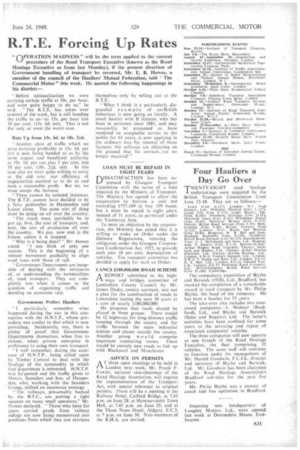R.T.E. Forcing Up Rates
Page 5

If you've noticed an error in this article please click here to report it so we can fix it.
" OPERATION MADNESS" will be the term applied to the current procedure of the Road Transport Executive (known as the Koad Haulage Executive as from last Monday), if the present direction of Government handling of transport be reversed, Mr. E. B. Howes, a member of the council of the Hauliers' Mutual Federation, told The Commercial Motor" this week. He quoted the following happenings in his district:
" Before nationalization we were carrying certain traffic at Ns. per hour, and were quite happy to do so," he said. "The R.T.E, has taken over control of the work, but is still handing the traffic to us-at 15s. per hour less 10 per cent. (13s. 6d. net). That is not the only or even the worst case.
Rat? Up from 13s. 6d. to 18s. 2id.
"Another class of traffic .which we were carrying profitably at 13s.. 6d. per ton.is now being handed to its bY the same .arigusi -and benefieen1 alithority at 19s. 3d: per ton Plus 5 Pet-cent. less
10 per cent. (18s. 2J,c1. net). In this case also We were qUite willing to carry at the' old rate: our 'effieiericy of Organiiationenabled us to do so and earn a reasonable profit. But no, we Must accept the increase.
"These cannot be isolated, instances. The R.T.E. cannot have decided. to be af fairy godmother in Harpendee and Luton alone. The same sort of thing Must be going on all over the _country.
" The result . must inevitably he to put up, first, the cost or transport, and, next, the cost of production all over the country. We pay, now and in the future, unless it is stopped.
"Why is it being done?" Mr. Hewes asked. can think of only one reason. This is the beginning of a sinister mOvement gradually to align road rates with those of rail.
" Government Departments are incapable of dealing with the intricacies of, or understanding the technicalities of, road transport. They are coinpletely lost when it comes to the question of organizing traffic and deciding an economic rate.
Government Prefers Hauliers "I particularly remember what happened during the war in this connection with the H.N.T.P., whose procedure was similar to that which is now prevailing. Incidentally, too, there is plenty of proof that Government Departments themselves, when free to choose, select private enterprise in preference to using their own transport.
I well remember, during the existence of 11.N.T.P.. being called upon by Timber Control to deal with the haulage of the commodity in which that department is interested. H.N.T.P. was by-passed and the traffic given to Messrs. Saunders and Son, of Harpenden, who, working with the Saunders Group, shifted an enormous tonnage.
The railways, presumably backed by the 1R.T.C., are putting a tight squeeze on many small operators," Mr. Howes declared. "Those who have for years carried goods from railway sidings are now being manceuvred into positions from which they can extricate "What I think is a particularly disgraceful ex a m p.1 e Of un-British behaviour is now going on locally. A small haulier with B licences, who has been in existence since 1885, and may reasonably be presumed to have rendered an acceptable service to the public for,64 years, is now applying in the ordinary way for renewal of those licences: the railways are objecting on the ground that his services_ are no longer required!
LOAN .MUST BE REPAID IN EIGHT YEARS nISSAT1SFACTION has been ex
pressed by Glasgow Transport Committee with the terms of a loan imposed by the Ministry of Transport. The Ministry has agreed to 'allow the corporation to borrow a slim not exceeding £757,169 to buy 199 buses, but it must be repaid in eight years. instead of 31 years, as permitted under the Tramways Acts.
To meet an objection by the corporation, the Ministry has stated that it is willing to make an Order under the Defence Regulations, relaxing the obligation under the Glasgow Corporation Confirmation Act, 1922, to provide each year 10 per cent, depreciation of vehicles. The transport committee has decided to apply for such an Order.
LANCS 1180,000,000 ROAD SCHEME
PIA REPORT submitted to the highways and bridges committee of Lancashire County Council by Mr. James Drake, county surveyor, sets out a plan for the construction of roads in Lancashire during the next 30 years at a cost of nearly £180,000,000.
He proposes that roads should be placed in three groups. There would be 12 highways for long-distance traffic running through the county and for traffic between the main industrial centres and places outside the county. Another group would comprise important connecting routes. There would be entirely new roads to link up with Blackpool and Manchester.
ADVICE ON PERMITS
AT three open meetings to be held in London next week, Mr. Frank F. Fowler, national vice-chairman of the Road Haulage Association, will explain the implementation of the Transport Act, with special reference to original permits. There will be a meeting at the Railway Hotel, Catford Bridge, at 7.45 p.m. on June 28, at Hammersmith Town Hall, at 7,45 p.m. on June 29, and at the Three Nuns Hotel, Aldgate, E.C.3, at 7 p.m. on June 30. Non-members of the R.H.A. are invited.




























